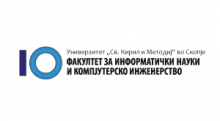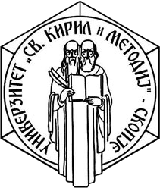Search results
Табови
Eftim Zdravevski Ph.D.
Табови
Kosta Mitreski Ph.D.
Табови
Biljana Stojkoska Ph.D.
Почитувани членови на IEEE, почитувани колеги,
Ни претставува особена чест и задоволство да Ве поканиме на предавањето на м-р Дарио Стојановски на тема „Recent Findings and Advances in Context-Aware and Unsupervised Neural Machine Translation“ што ќе се одржи online, преку платформата Zoom, на 16.12.2020 од 18:00 часот.
Предавањето ќе се реализира како заеднички настан на локалните оддели за компјутери, едукација, роботика и автоматика, системи, човек и кибернетика, телекомуникации и теорија на информации при Македонската секција на IEEE, групата Data Science Macedonia, како и Факултетот за информатички науки и компјутерско инженерство (ФИНКИ) и Факултетот за Електротехника и информациски технологии (ФЕИТ).
Повеќе информации за настанот, темата и предавачот можете да најдете на овој линк. Присуството на настанот е бесплатно и слободно за сите заинтересирани, а пожелно е да се регистирате на овој линк.
На настанот може да се вклучите преку овој линк.
Ве очекуваме!

Ни претставува голема чест да Ве поканиме на предавањето на тема „The myelin-weighted connectome: A new look at neurodegenerative diseases“ што ќе се одржи на 20.12.2022 година со почеток во 13:00 часот од страна на д-р Томи Бошковски.
Предавањето ќе се организира како резултат на заедничката соработка меѓу ИЕЕЕ одделите за копјутери од Естонија, Норвешка, Обединетото Кралство и Ирска, Данска, Полска, Египет, како и одделите за компјутери (C16), едукација, роботика и автоматика, системи, човек и кибернетика (E25/RA24/SMC28), телекомуникации (COM19), теорија на информации (IT12), здружениот оддел за процесирање на сигнали и инженерство во медицината и биологијата (SP01/EMB18), афинитетната група на доживотни членови на ИЕЕЕ, (LM80077) при македонската секција на ИЕЕЕ, како и Факултетот за информатички науки и компјутерско инженерство (ФИНКИ), Факултетот за Електротехника и информациски технологии (ФЕИТ), Факултетот за информатички и комуникациски технологии (ФИКТ) и групата Data Science Macedonia.
Повеќе информации за настанот, темата и предавачот може да најдете на овој линk
Табови
д-р Андреј Ристески
Табови
д-р Сузана Лошковска

Description:
Join us for an engaging exploration of how machine learning, artificial intelligence, and neural networks are revolutionizing key sectors of society. This talk delves into the innovative intersections of these technologies with finance, economics, and healthcare. We will discuss cutting-edge research, practical applications, and future possibilities, highlighting how interdisciplinary collaboration is shaping smarter solutions to complex challenges. Discover the opportunities and implications of these advancements and gain insights into the transformative potential of AI across diverse fields.

